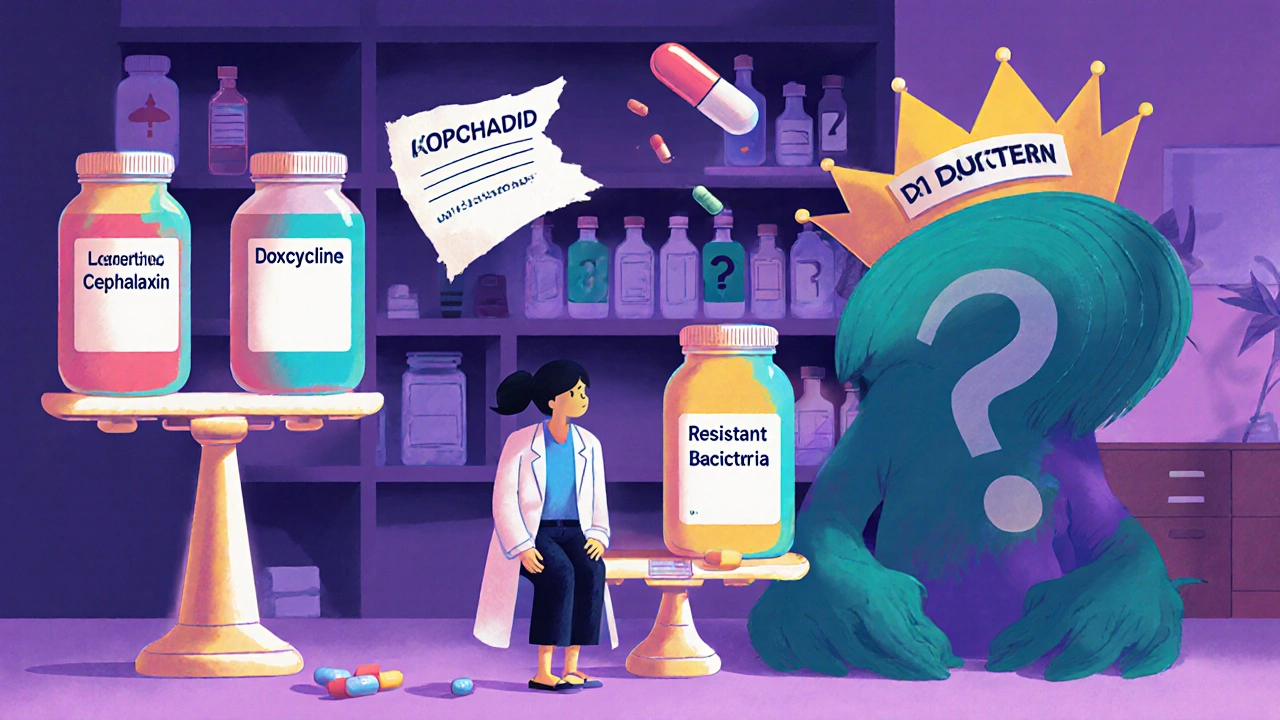Antibiotic Selection Guide
Which Antibiotic Might Be Right for You?
This tool helps you understand potential antibiotic options based on symptoms and medical factors. It's not medical advice—always consult your healthcare provider for personal recommendations.
Select Your Symptoms
Recommended Options
If you’ve been prescribed Azipro (azithromycin), you’re not alone. It’s one of the most common antibiotics used for respiratory, skin, and ear infections. But you might be wondering: is it the best choice? Are there other options that work just as well-or even better-for your specific case?
What is Azipro (Azithromycin)?
Azipro is a brand name for azithromycin, a macrolide antibiotic that stops bacteria from growing by interfering with their protein production. It was first approved in the 1990s and quickly became popular because of its simple dosing: often just one pill a day for three to five days.
Doctors reach for azithromycin for common infections like strep throat, sinusitis, bronchitis, and some types of pneumonia. It’s also used for sexually transmitted infections like chlamydia. Unlike penicillin-based antibiotics, it’s usually safe for people with penicillin allergies.
But here’s the catch: azithromycin doesn’t work for every infection. And overuse has led to growing bacterial resistance-especially in places like Australia, where antibiotic prescriptions are high. That’s why knowing your alternatives matters.
Why You Might Need an Alternative
Not all infections respond to azithromycin. If your symptoms don’t improve after a few days, or if you’ve taken it before and it didn’t help, you might be dealing with a resistant strain. Some bacteria, like certain strains of Streptococcus pneumoniae and Mycoplasma pneumoniae, are now less responsive to azithromycin.
Also, azithromycin can cause side effects like nausea, diarrhea, and stomach pain. In rare cases, it may affect heart rhythm, especially if you already have heart conditions or are taking other medications that interact with it.
If you’re looking for something that works faster, has fewer side effects, or is more effective against your specific infection, you have options.
Azithromycin vs Amoxicillin: The Classic Comparison
Amoxicillin is the most common alternative to azithromycin. It’s a penicillin-type antibiotic, so it works differently: it kills bacteria by breaking down their cell walls.
Here’s how they stack up:
| Feature | Azithromycin (Azipro) | Amoxicillin |
|---|---|---|
| Drug Class | Macrolide | Penicillin |
| Dosing Duration | 3-5 days | 7-10 days |
| Typical Dose | 500 mg once daily | 500-1000 mg every 8-12 hours |
| Best For | Atypical pneumonia, chlamydia, sinusitis | Strep throat, ear infections, urinary tract infections |
| Penicillin Allergy Safe? | Yes | No |
| Common Side Effects | Nausea, diarrhea, abdominal pain | Diarrhea, rash, yeast infections |
| Resistance Risk | High in some regions | High in community strains |
Amoxicillin is often the first-line choice for ear infections and strep throat because it’s more reliable against the bacteria that cause them. Azithromycin is preferred when the infection might be caused by atypical bacteria (like Mycoplasma) or when a patient can’t take penicillin.

Other Alternatives to Consider
There are more than two options. Depending on your infection, your doctor might consider:
- Doxycycline - A tetracycline antibiotic often used for sinus infections, bronchitis, and Lyme disease. It’s taken twice daily for 7-14 days. Not recommended for children under 8 or pregnant women.
- Cephalexin - A cephalosporin antibiotic, similar to penicillin but often safe for mild penicillin allergies. Commonly used for skin and soft tissue infections.
- Levofloxacin - A fluoroquinolone used for more serious respiratory infections. Reserved for cases where other antibiotics fail because of potential side effects like tendon damage and nerve issues.
- Clarithromycin - Another macrolide, very similar to azithromycin. Sometimes used if azithromycin isn’t working, but resistance patterns are often the same.
Each of these has trade-offs. Doxycycline can cause sun sensitivity. Cephalexin might not cover all respiratory bugs. Levofloxacin is powerful but comes with black-box warnings from the FDA.
When to Stick With Azithromycin
Azithromycin still has its place. If you have a confirmed chlamydia infection, it’s often the top choice. For people with penicillin allergies, it’s a go-to. It’s also convenient-fewer pills, shorter course.
In Australia, the Therapeutic Goods Administration (TGA) recommends azithromycin for chlamydia as a single 1g dose. That’s a clear, evidence-backed use.
If you’re traveling and need a broad-spectrum antibiotic for traveler’s diarrhea, azithromycin is often preferred over other options because it’s effective against many bacterial strains found in developing countries.
What Your Doctor Won’t Always Tell You
Many infections-especially colds, flu, and most sore throats-are viral. Antibiotics don’t help those. Yet, patients often expect them. That’s why some doctors prescribe azithromycin even when it’s not needed, just to satisfy the patient.
But here’s the truth: if you have a viral infection, taking azithromycin won’t make you feel better faster. It just increases your risk of side effects and contributes to antibiotic resistance.
Studies from the CDC show that up to 30% of antibiotic prescriptions in outpatient settings are unnecessary. In Australia, that number is similar. You’re not helping yourself by taking antibiotics when they’re not needed.
Ask your doctor: “Is this infection bacterial? What’s the evidence? Are there alternatives that are more targeted?”

What to Do If Azithromycin Didn’t Work
If you took azithromycin and your symptoms didn’t improve after 3-5 days:
- Don’t take another dose or double up.
- Call your doctor. You may need a different antibiotic or further testing.
- Be ready to describe your symptoms: Did the fever return? Is the cough getting worse? Any new symptoms like chest pain or shortness of breath?
- Don’t self-prescribe from leftover antibiotics. That’s how resistant infections spread.
Some people try natural remedies like honey for coughs or saltwater gargles for sore throats. These can help with symptoms-but they won’t kill bacteria. Don’t confuse symptom relief with treatment.
Final Thoughts: Choosing the Right Antibiotic
There’s no single “best” antibiotic. The right one depends on:
- The type of infection you have
- Your medical history (allergies, heart conditions, other meds)
- Local resistance patterns (what’s common in your area)
- How well you can stick to the dosing schedule
Azithromycin is convenient and useful-but not always the most effective. Amoxicillin might be better for ear infections. Doxycycline could be the answer for stubborn sinusitis. Your doctor should match the drug to your infection, not the other way around.
If you’re unsure, ask for a throat swab, a rapid strep test, or a sputum culture. These tests can tell you exactly what’s causing your illness-and whether you even need an antibiotic at all.
Is Azipro the same as azithromycin?
Yes. Azipro is a brand name for the generic drug azithromycin. They contain the same active ingredient and work the same way. Generic azithromycin is often cheaper and just as effective.
Can I switch from azithromycin to amoxicillin myself?
No. Never switch antibiotics without talking to your doctor. Taking the wrong one can make your infection worse or cause dangerous side effects. Amoxicillin won’t work if you have a macrolide-resistant infection, and it can trigger allergic reactions if you’re sensitive to penicillin.
Which is better for a sinus infection: azithromycin or amoxicillin?
For most bacterial sinus infections, amoxicillin is the first choice according to guidelines from the Infectious Diseases Society of America. Azithromycin is only recommended if you’re allergic to penicillin or if the infection doesn’t respond to amoxicillin.
Does azithromycin cause heart problems?
In rare cases, yes. Azithromycin can slightly increase the risk of irregular heart rhythms, especially in people with existing heart conditions, low potassium or magnesium levels, or those taking other drugs that affect heart rhythm. If you have a history of heart issues, your doctor will weigh the risks before prescribing it.
How do I know if my infection is bacterial or viral?
It’s hard to tell on your own. Viral infections usually come with clear symptoms like runny nose, sore throat, and cough that get better in 7-10 days. Bacterial infections often last longer, cause higher fevers, or have worsening symptoms after a few days. A doctor can order tests like a rapid strep test or CRP blood test to help decide.
Next Steps
If you’re currently taking Azipro, finish the full course-even if you feel better. Stopping early increases resistance. If you’re unsure why you were prescribed it, ask your doctor for clarification. If you’ve had side effects, report them to your pharmacist or healthcare provider.
For future infections, keep a record of what antibiotics you’ve taken and how they worked. That info helps your doctor choose better options next time.
Antibiotics save lives-but only when they’re used right. Choosing the right one isn’t about convenience. It’s about matching the drug to the bug, and knowing when not to use one at all.


Comments (8)
Casey Crowell
Man, I got prescribed Azipro last winter for what I thought was a sinus infection. Turned out it was just a stubborn virus. Felt like a sucker. Antibiotics are not candy, people. 🤦♂️
Shanna Talley
So true. I used to think antibiotics were magic pills until my kid got a rash from amoxicillin and we learned the hard way that sometimes rest and fluids are the real treatment. 🌿
Samuel Wood
Ugh. Another one of these 'antibiotics are bad' posts. Like we dont know that. But if you have a bacterial infection and azithromycin works? Dont be a hero. Take it. The TGA says so. 😴
ridar aeen
Samuel, you're missing the point. It's not about refusing antibiotics-it's about not using them like they're vitamins. I had a doctor prescribe azithro for a cold once. I asked for a test. He rolled his eyes. That's the problem.
chantall meyer
Anyone who takes antibiotics without a culture test is basically playing Russian roulette with their microbiome. I've seen too many patients with C. diff after unnecessary macrolides. You think you're helping yourself but you're just feeding superbugs.
Lorne Wellington
As someone who's been on both sides of the stethoscope-patient and caregiver-I can say this: the real hero here isn't the drug. It's the doctor who listens. Ask for the test. Ask for the why. Ask for the alternative. You're not being difficult-you're being smart. 💪
Will RD
Stop overthinking it. If your throat hurts and you got a script, take it. You dont need a PhD to know when you're sick. Azithro works. End of story.
Jacqueline Anwar
It is deeply concerning that public discourse on antimicrobial stewardship has been reduced to casual Reddit banter. The clinical nuances of resistance patterns, pharmacokinetics, and evidence-based guidelines are being trivialized by oversimplification. This is not merely a matter of personal preference-it is a public health crisis.